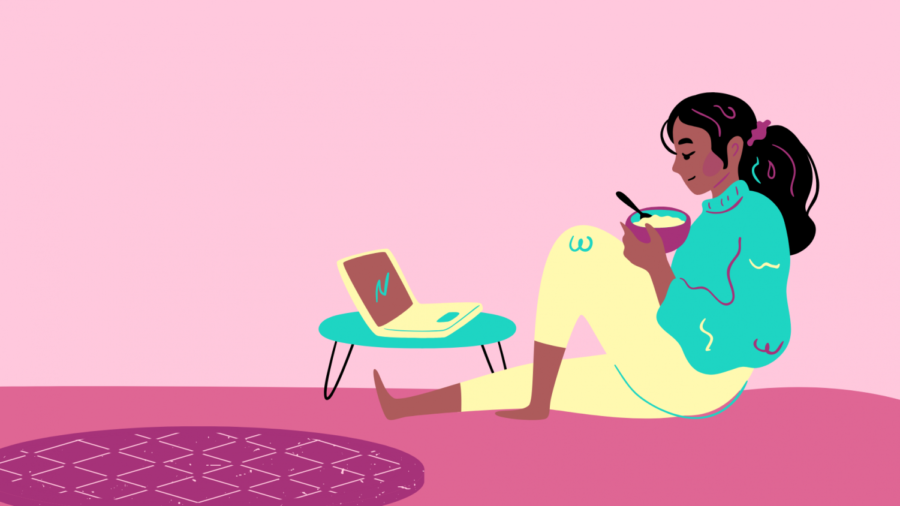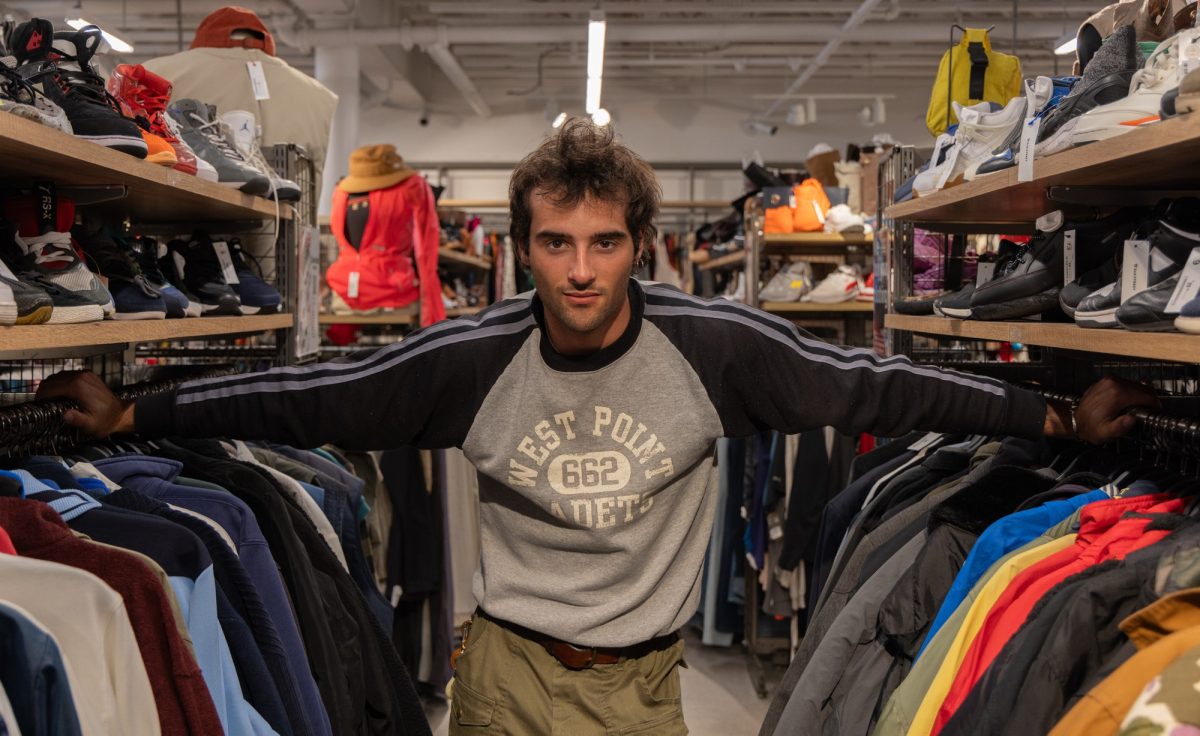Sick days as a kid were so easy.
You wake up one morning with a sore throat, a fever, maybe a stomach ache. Instead of stumbling over to your computer to write excessively long and apologetic emails to professors, your mom makes a call. She calls the school, tells them you’re not feeling well, and you’re excused without penalty. Maybe a friend will bring your homework over after school. Your best friend will catch you up on all the drama that you missed. Maybe your bio lab partner texts to check in on you. Your teacher will probably help you get caught up when you’re back.
Sick days were comforting as a kid. Your only goal was to rest. My mom’s go-to sick day treatment was sleep, Harry Potter DVDs and Matzo ball soup. I’m studying to be a doctor, but I fully believe that homemade soup might be the best medicine out there.
Of course, life isn’t that easy anymore. In college, you’re an adult and responsible for your own choices, self-care and doctor’s appointments. It’s your own responsibility to catch up on work you missed when out sick. There is nobody to excuse your absences, to help you catch up or to help you realize you need to rest. When you get sick in college, it’s up to you to figure it out.
Among the sounds of frantic notetaking and my professor’s voice addressing the 150 students in my 9 a.m. Organic Chemistry lecture, I hear a nonstop chorus of coughing. Strong sniffles and suppressed coughs seem to come from every direction in lectures now. Between the frat flu and the actual flu, it seems like everyone on campus is sick. Making up missed work is one of the most miserable and stress-inducing pressures on campus, especially when you’re not feeling 100 percent. It’s what keeps me going to class, even when I probably shouldn’t. In my personal experience, most Vanderbilt students who don’t feel well end up going to class, dining halls and club meetings. It’s understandable: missing class forces students to decide between sitting sick in class or relying on someone else’s interpretation of the lecture.
The idea that students can miss class without repercussions is a myth. Maybe you were relatively lucky and missed an easy lecture or your friend who took notes has semi-legible handwriting. But this is the exception. After 48-hours of curling up in the fetal position on your dorm bathroom floor, you probably discovered that you missed every single important point covered on the exam. You missed the fundamentals of a next unit or crucial material not covered in the textbook. When you feel well enough to try again, you’re now so far behind in the curriculum that you might as well accept that you’ll fail that section of the exam. The compounded stress when you are sick close to an exam day makes the guilt even worse.
I’m writing this piece from my dorm in the two hours between classes that I am allowed to actually “be sick.” The stress of missing my class tonight is greater than the benefit I would get from staying in bed. I have two hours to take Day-Quil, down cough drops like candy and try to get better.
I hate going to class when I’m sick. I worry the whole lecture about how loud my nose-blowing is or how long it’s been since I last coughed. I don’t like knowing that I could pass my germs to the rest of my classmates.
But just like every other student coughing their way through a morning lecture or night lab, I’m worried about my GPA.
As Nashville weather shifts suddenly from sunny and warm to absolutely frigid, students are spending more time inside. Self-care and staying healthy have become more important than ever for our health. A decrease in sleep makes us more susceptible to illness after exposure and weakens our immune system response. Not getting enough nutrition or depending only on late-night snacking can make the problem worse. Those sleeping less than seven hours are 2.94 times more likely to develop a cold than those who sleep over eight hours. Lack of sleep can also affect how long it takes you to recover fully when you do get sick.
Even though I’ve been vaccinated against COVID-19, tested for COVID-19 and have a thousand other reasons to be sick, there is still the nagging voice in my head telling me that I might have it. We’re still in the middle of a pandemic, which makes the moral guilt of going to class even worse.
For first-year students experiencing college life for the first time, I am sure this all feels worse. The transition to college is new and stressful and can impact the immune system. Ramped-up academics, in-person classes for the first time, new social scenes, different food, sharing a room—this all has an impact. When you add in staying up late every night, sustaining on Munchie sushi and alcohol, we’ve made the perfect recipe for illness.
A study led by Carnegie Mellon University professor Sheldon Cohen found that increased stress limits the body’s response to cortisol, which inhibits the ability to regulate inflammation. As a result, people are more likely to develop a cold when exposed to a virus. Those of us pulling all-nighters in Stevenson library are less likely to remain healthy long term.
So, what needs to change?
Even when professors are lenient with absences, students may feel they cannot miss a class due to the volume of makeup work required, as well as the stress of explaining a potentially undiagnosed sickness to a professor.
“There will be no Zoom lectures for those who cannot attend class,” one of my syllabi reads.
“Functionally, there is no such thing as an excused absence,” reads another.
This practice of students attending class even while feeling ill puts classmates, faculty, staff and neighbors at risk. To combat this problem, Vanderbilt should work to standardize professor absence policies and implement a minimum number of sick days required for each course. The university should also allow—and encourage—professors to post recorded video lectures taken during COVID-19 teaching. Some professors and departments actively refuse to have a Zoom option due to university advice to hold only in-person classes.
Professors get sick, too. They too face the pressure of a pandemic, worries about performing their job while keeping their loved ones safe and conflicting messages from students and administrations. Faculty have had to make difficult decisions. Standardizing absence policies takes the burden off individual professors and allows students to feel safe taking time off.
At Vanderbilt, it is easier to keep on going even when your body is telling you to stop. It is easier to forego rest for the promise of a higher grade, take a short nap in a corner of the library and embrace schedules that groan under the weight of classes and extracurriculars. Many of us wear sacrifice as a badge of honor—it’s the quintessential Vanderbiltian rite of passage.
It is also our own responsibility to encourage the culture we want to see. We need to develop a willingness to reverse our most ingrained habits in the interest of long-term self and community care. We need to encourage a culture where it is okay to take a sick day. There should be a sustained push across the student body and faculty to support students who take a day off, who take care of their health, who put their health before their grades.
Remember also that your mental health is part of your well-being too. If your sick day applies to your mental health too, that is okay. Treat a mental health crisis the same way you would treat a physical health crisis. You do not have to feel guilty about prioritizing your well-being.
If your body is telling you that it isn’t feeling well, you deserve to take it easy for a day. Not taking care of yourself when you feel ill can prolong sickness and can also spread whatever you have to those around you. You can be selfless by staying home and protecting your classmates; you do not need to earn the right to take care of yourself. Your health is the basis for you to attend all of your classes and extracurriculars and actually engage and understand.
It is difficult for me to take my own advice. I still feel that I can’t take a sick day. I’ve reached the end of my two hours of scheduled sick time and still have hours of nighttime lab and a mountain of assignments due this week. At the end of writing this article, I will still go to class. Maybe tomorrow I can give myself a break.
But right now? I would do anything for a Harry Potter DVD and a bowl of my mom’s Matzo ball soup.
This story was originally published on The Vanderbilt Hustler on November 6, 2021.







































